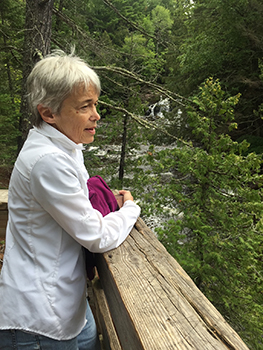In the Wisconsin Sea Grant online newsroom, we recently introduced four new members of the Advisory Council. Council members help shape Sea Grant’s future, enabling it to better serve the people of Wisconsin.
Now, here on our blog, we’d like to give people a chance to get to know those four newcomers better through Q & As. Our second installment features Madelyn Leopold, a retired attorney and private landowner.
You can find our previous post about Duluth Seaway Port Authority Executive Director Deb DeLuca here. Keep following the blog for future posts on the remaining two new members: Becky Sapper and Lori Tate.

Madelyn Leopold (submitted photo).
Do you have a favorite spot in the Great Lakes, or favorite natural area?
I love rivers, so my favorite spots usually have a river somewhere in the scene. One favorite is Pikes Peak State Park in Iowa, across the Mississippi from Prairie du Chien, at the confluence of the Wisconsin and Mississippi Rivers. The views from the high bluffs in that park always remind me of how vast and grand our Midwestern landscape is.
What drew you to say “yes” to serving on the Advisory Council?
To be honest, it was (Sea Grant Assistant Director for Communications) Moira Harrington. She and I serve together on the Board of Park Commissioners in Madison. Moira always brings a broad, science-based perspective to the board discussions. It was clear that her lens was much broader than most, and I credited some of that perspective to her work with Wisconsin Sea Grant. I was curious to know more about her organization and the work that it does.
Is there a special aspect of Sea Grant’s work or mission that speaks to you the most?
I am excited about many elements of Sea Grant’s work and mission. What comes first to mind is its emphasis on engaging young people of diverse backgrounds in science-based projects; we need to broaden the community of people who care and are smart about managing our waters.
I’m also excited about how Sea Grant’s work engages communities and businesses in local projects where the impacts can be seen and appreciated and supported; these connections are important for expanding the public’s understanding and support of scientific research.
It’s also great to see the “Wisconsin Idea” reach into so many corners of the state through Sea Grant’s focus on a resource that all Wisconsinites know and love–their waters and waterways.
Where would you like to see Sea Grant headed in the near future?
I’d like to see Sea Grant’s work become better known among the general public; the stories coming out of its work are interesting and compelling.


